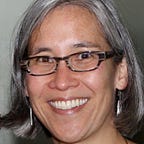What is Enough?
Empathy as an aliquot string.
Solidarity with other people’s suffering teaches as much as direct suffering does, and often more so because of love.
- Richard Rohr, The Immortal Diamond
Last month, I started watching The Underground Railroad, director Barry Jenkins’ adaptation of Colson Whitehead’s Pulitzer Prize-winning novel. Jenkins has been praised for his “unflinching” portrayal of enslavement. The 10-part series is described as “unbearably painful…and achingly beautiful.” The producers had counselors on set to support the cast and crew through the emotional trauma of filming, and it’s easy to understand why. At the end of the first episode, I was agitated — I had the urge either to go for a run (except it was 10 pm) or shut down.
I am not good at meditating, but more nights than not, I designate 20 minutes to sit on a small wooden kneeling bench on the carpeted floor of the attic, where I typically pass the time trapped in the swirl of my thoughts, rather than letting them float by, as I’ve been instructed. Even so, I headed upstairs hoping it might help me settle. At first, I judged myself for overreacting—none of this happened to me or my ancestors, nor have I or any of my ancestors enslaved others¹ — I worried my emotional response was a form of appropriation that I didn’t have a right to as a (mostly)² white-identified woman watching a dramatization from the comfort of my couch. But having just read about completing the cycle and “feeling my feels,” I sat on the purple-cushioned bench dwelling on the racial tension in our world and allowing myself the hopelessness and profound sadness it brings up. Although I’ve been on friendlier terms with the voice in my head in recent years, the refrain I kept hearing was: “You are not enough, you are not enough, you are not enough.” Instead of trying to counter and assert my worth, I let the words sink in. The voice wasn’t taunting me, it was stating a simple truth: I am not enough. I will never be enough. I cannot undo our history or unravel the knot of problems that plague and divide us. In the quiet, the message continued: “What you can do is exactly this — sit still and feel the discomfort. Don’t run, don’t shut down, but don’t look away, even if you flinch the entire time.”
Jenkins’ depiction had enabled me to see from a perspective that we don’t get with reading an article or watching a news clip. Great art does that—cracks us open to a new way of imagining, sometimes putting ourselves into the story or the song. My upset was not appropriation, it was empathy.
The image of a piano string comes to mind. In a standard piano, each key in the middle octaves is linked to 3 strings that vibrate and emit sound when struck with the hammer inside. One string will do, but 3 strings generate a much fuller tone. I had heard about a piano built in the 19th century, which incorporates a 4th “aliquot” string that is not connected to the hammer mechanism. It is tuned to the harmonic frequency of the adjacent strings, such that when they oscillate, it, too, begins to vibrate through the phenomenon of sympathetic resonance. The aliquot string is never struck by the hammer. By itself, it is useless. But when the strings resonate together, the note is enriched and amplified.
Defining “enough” is about fulfilling demands, needs, and expectations. One way to approach it is from the perspective of having enough — with a mindset of abundance or scarcity. Another relates to being enough — balancing the never ending quest for excellence and authenticity with acceptance that we are fundamentally flawed. In our challenging world, we’re more keenly aware of falling short than feeling satisfied, and with good reason—the demands, needs, and expectations we face are enormous right now. Maybe when we feel overwhelmed and inadequate, as though we have nothing to offer and will never be enough, we can tune toward resonance and see what happens.
¹As far as I know.
² I am an Asian-American woman who was raised with a predominantly white identity.
